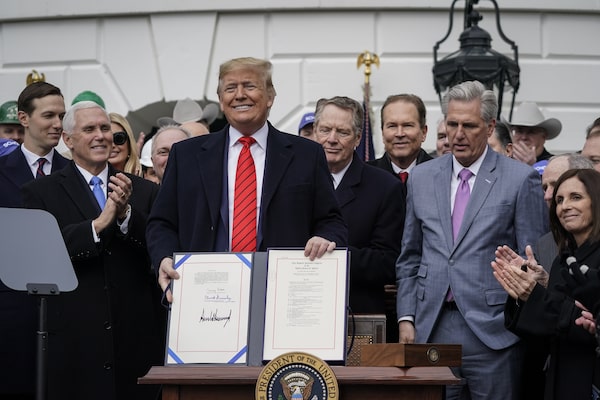
U.S. President Donald Trump stands after signing the United States-Mexico-Canada Trade Agreement during a ceremony on the South Lawn of the White House on Jan. 29, 2020, in Washington.Drew Angerer/Getty Images
You’d have never known that President Donald Trump was facing impeachment proceedings on Capitol Hill.
At the White House Wednesday, he was a picture of contentment owing to a trade deal he was signing with Canada and Mexico.
The band played Hail to the Chief as he triumphantly arrived at the White House South Lawn. He rarely stopped grinning throughout the hour-long ceremony. He was ending what he hyperbolically called “the NAFTA nightmare.”
It’s a “momentous” occasion, Mr. Trump beamed. The new USMCA agreement replacing NAFTA was a “colossal victory” for the United States.
He spoke as if his side had won the trade negotiation hands down. He made only brief passing reference to Prime Minster Justin Trudeau, an indication that relations were still rocky after their confrontation at a recent NATO summit where Mr. Trump called the Prime Minister “two-faced.”
Earlier this month at the signing of a phase-one trade agreement with China, Mr. Trump had heaped praise on its leader, President Xi Jinping. Not so for Canada.
Neither Mr. Trudeau nor Deputy Prime Minister Chrystia Freeland, a lead negotiator for the new accord, were at the ceremony, only acting ambassador Kirsten Hillman. I asked her about his one-sided depiction of the agreement. “It’s a great deal for everyone,” she said, and former Canadian ambassador David MacNaughton chimed in with the same sentiment.
Ms. Hillman received a hug from Mr. Trump’s son-in-law, Jared Kushner, who has become what might be called minster of everything in the Trump government and who played a significant role in the new NAFTA negotiations.
During the ceremony, while signalling out dignitaries Mr. Trump asked, “Where is the Canadian contingent?” He paused and, referring to the old NAFTA, said, "You guys did a good job on us before this deal.”
That was a compliment to Brian Mulroney’s team who negotiated that pact, though trade experts don’t believe the U.S. side got hosed the way Mr. Trump does.
With the impeachment proceedings at a perilous stage, it was thought that Mr. Trump would take advantage of the occasion to address it. But his only reference to the impeachment trial was while he was praising Republican senators in the audience. “Maybe I’m just being nice to them because I want their vote,” he said.
At the senate trial, Democrats and Republicans were asking questions of one another. Pointing to Texas senator Ted Cruz, Mr. Trump said, “Boy oh boy, he’s dying to get back there and ask those questions. … He’s got some beauties, I bet.” Mr. Cruz, seated in front of me, chuckled away merrily.
As a sign of the extreme rift in the capital, no Democrats were in attendance. They weren’t invited, even though they had ratified the accord and even though U.S. Trade Representative Robert Lighthizer had wanted to invite them.
Democrats had won changes to labour and environment aspects of the accord, moving it further to the left than most Republicans are normally comfortable with.
Despite his exaggerations on the horrors of NAFTA – the deal was a major factor in more than tripling America’s trade with Canada and Mexico – Mr. Trump had good reason for the pleasure he displayed.
As he reminded everyone, changing his country’s trade dynamic was a major reason that he got into politics. And with the new North American accord, which still has to be ratified by the Canadian Parliament, and the first-phase trade agreement with China and other agreements, he is fulfilling that mandate.
“For the first time in American history,” said Mr. Trump of the USMCA, “we have replaced a disastrous trade deal that rewarded outsourcing with a truly fair and reciprocal trade deal that will keep jobs, wealth and growth right here in America.”
Though Canadian officials are generally pleased with the new accord, as it will restore stability to the continental trading regime, the bullying treatment that Mr. Trump bestowed on Ottawa to get the agreement is not forgotten.
He repeatedly threatened to withdraw from NAFTA. He imposed steel and aluminum tariffs and held out the possibility of ruining the Canadian economy with back-breaking auto tariffs.
Oftentimes, he treated the close friend and ally like a long-time adversary. Though Canadian officials aren’t saying it, they could be forgiven for thinking that there’s a touch of poetic justice in seeing this President under threat of removal from office for abuse of power in the running of his foreign policy.
Keep your Opinions sharp and informed. Get the Opinion newsletter. Sign up today.
 Lawrence Martin
Lawrence Martin